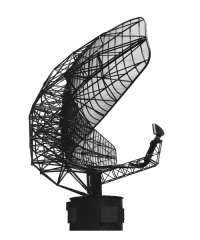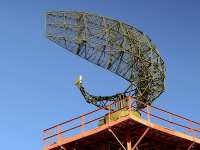ARSR-1, -2
Description of the radar set, tactical-technical characteristics

Figure 1: Type 7172 antenna, ARSR-1
| Specifications | |
|---|---|
| frequency: | 1 215 … 1 350 MHz
(L-Band) |
| pulse repetition time (PRT): | |
| pulse repetition frequency (PRF): | 360 Hz |
| pulsewidth (τ): | 2 µs |
| receive time: | |
| dead time: | |
| peak power: | 4 MW |
| average power: | 2.9 kW |
| instrumented range: | 200 NM (≙ 370 km) |
| range resolution: | |
| accuracy: | |
| beamwidth: | 1.2° |
| hits per scan: | |
| antenna rotation: | 6 min-1 |
| MTBCF: | |
| MTTR: | |
ARSR-1, -2
The ARSR-1 was an early, operating in L-Band Air Route Surveillance Radar introduced in 1958. It was the first civil long-range radar (LRR) system designed primarily to provide a display of aircraft locations over large areas. 29 sites ARSR-1 were installed from 1957 through 1964. 17 sites ARSR-2 since 1960. Both radars use crossed-field amplifiers (amplitrons) as their final output stage. The ARSR-2 got a number of filters to reduce parasitic emissions of unwanted frequencies.
The radars were replaced by Westinghouses ARSR-3, later by ARSR-4.

